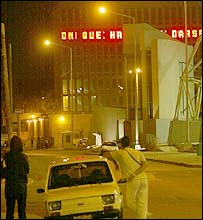City University of New York, and "pondering rude words"Betsy posts on an article from The Economist I read a couple of days ago,
Higher education and the poor: Rebuilding the American dream machine. A parable of elitism in universities about City University of New York
What went wrong? Put simply, City dropped its standards. It was partly to do with demography, partly to do with earnest muddleheadedness. In the 1960s, universities across the country faced intense pressure to admit more minority students. Although City was open to all races, only a small number of black and Hispanic students passed the strict tests (including a future secretary of state, Colin Powell). That, critics decided, could not be squared with City's mission to “serve all the citizens of New York”. At first the standards were tweaked, but this was not enough, and in 1969 massive student protests shut down City's campus for two weeks. Faced with upheaval, City scrapped its admissions standards altogether. By 1970, almost any student who graduated from New York's high schools could attend.
The quality of education collapsed. At first, with no barrier to entry, enrolment climbed, but in 1976 the city of New York, which was then in effect bankrupt, forced CUNY to impose tuition fees. An era of free education was over, and a university which had once served such a distinct purpose joined the muddle of America's lower-end education.
By 1997, seven out of ten first-year students in the CUNY system were failing at least one remedial test in reading, writing or maths (meaning that they had not learnt it to high-school standard). A report commissioned by the city in 1999 concluded that “Central to CUNY's historic mission is a commitment to provide broad access, but its students' high drop-out rates and low graduation rates raise the question: ‘Access to what?’ ”
I had a small taste of the very low standards at the CUNY of the early 1990s.
Back then I volunteered as Spanish reader for Recording for the Blind and Dyslexic (years ago when it was Recording for the Blind), and had to read a grammar book written by a CUNY professor for his own students. It was, to put it mildly, god-awful. For starters, he didn't believe in making students learn to write the written accent, since the rules might confuse them. Verb use was left to the student's convenience (since all those Spanish verb conjugations are too much to handle in one semester). To make it even worse, he encouraged using Spanish-like forms of English words instead of the correct Spanish word, which is linguistically atrocious. Recording that textbook was at times hilarious, but mostly ridiculous, irritating, and exasperating.
The CUNY professor was teaching CUNY students who came from the Barrio.
The students from the Barrio had learned Spanish from parents of humble means, most of which (the students and their parents) had not benefited from a good education, and whose Spanish was faulty to begin with. The form of Spanish they spoke is commonly referred to as espangish (not capitalized because in Spanish the names of languages are not capitalized).
There's an espanglish story (I don't know if it's true) about Nobel Prize winner Camilo José Cela that illustrates what happens when you speak espanglish: Cela, who was a stylist -- with a reputation for foul language, and did a whole
dictionary of forbidden words -- once was visiting the Barrio, and struck a conversation with a guy who delivered groceries. Cela asked the man, in Spanish, "and, how do you make a living?"
to which the man, whose espanglish would have been reinforced at the CUNY class, replied, "Me paso el día deliberando groserías", meaning to say, "I spend my days delivering groceries", but actually saying, "I spend the day pondering rude words".
Cela heartily congratulated him on his choice of work.
But I digress. According to the information in the book I read at RFB&D, the Spanish course was an elective, for students who came from Spanish-speaking families but needed a remedial course. The textbook I read wasn't a remedy; it was a reinforcement of every bad habit the students had learned.
Spanish is a deceptively simple language to learn. After all, you read exactly what's written on the page. The written accent tells you where to place the stress on the word, unlike, for instance, French. What's hard about Spanish is learning to use the correct form of addressing the other person, including the usage of the proper verb tense and the appropriate vocabulary. A person who knows how to
appropriately use the language in a social context distinguishes him/herself socially, which, in turn, translates into a higher social standing. This is the case, of course, in any language.
The professor, by lowering his standards so the students wouldn't have too much hardship, was condemning his students to sounding like
ignoramuses. Their peers talked like that, which was fine with him, but anywhere else where educated Spanish speakers would meet them, the students’ ignorance would exclude them, no matter what it said on their CUNY diploma. The bigotry of this professor’s low expectations wasn't deadly, just damming. As The Husband said when he read the article, it was all based on the premise that it was the diploma that was valuable, not the knowledge behind the diploma.
I don't know if the professor who wrote the book is still there, but I certainly hope he's improved his (and his students') skills. The Economist article states that
higher standards have attracted more students, not fewer. . . There are also anecdotal signs that CUNY is once again picking up bright locals, especially in science.
. . .
For all its imperfections, CUNY’s model of low tuition and high standards offers a different approach.
As Betsy says, there’s a lesson there.
(technorati tags
City University of New York,
Culture,
education,
Camilo José Cela)






 Fidel can't wait to read on the news,
Fidel can't wait to read on the news,















